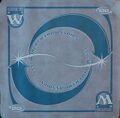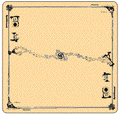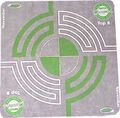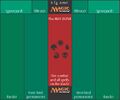Playmat: Difference between revisions
>Hunterofsalvation (→Khalsa) |
>Hunterofsalvation No edit summary |
||
| Line 3: | Line 3: | ||
==Khalsa== | ==Khalsa== | ||
[[Khalsa Brain Games]] was a very early producer of popular playmats made from an "imitation impala skin" material. The [[1995]] ''SpellGround'' gaming cloth came in two sizes: the standard 26 inch square for two players and the "Classic" 21 by 14 inch for one player. | [[Khalsa Brain Games]] was a very early producer of popular playmats made from an "imitation impala skin" material. The [[1995]] ''SpellGround'' gaming cloth came in two sizes: the standard 26 inch square for two players and the "Classic" 21 by 14 inch for one player. | ||
==Worlds== | ==Worlds== | ||
| Line 20: | Line 17: | ||
==Red Zone== | ==Red Zone== | ||
When ''Magic'' was being aired on ESPN2 (1998-2000), the people in charge wanted a playmat that would make the card layout easy to understand on television. The solution came to be known as the 'Red Zone, a mat that marks off where each players' [[lands]] and non-lands should go, as well as a large red central area for spells on the [[stack]], and - more importantly - for combat. The 'Red Zone' has become synonymous with [[attack]]ing. <ref>{{DailyRef|mtgcom/arcana/212|The Red Zone|[[Magic Arcana]]|October 24, 2002}}</ref> | When ''Magic'' was being aired on ESPN2 (1998-2000), the people in charge wanted a playmat that would make the card layout easy to understand on television. The solution came to be known as the 'Red Zone, a mat that marks off where each players' [[lands]] and non-lands should go, as well as a large red central area for spells on the [[stack]], and - more importantly - for combat. The 'Red Zone' has become synonymous with [[attack]]ing. <ref>{{DailyRef|mtgcom/arcana/212|The Red Zone|[[Magic Arcana]]|October 24, 2002}}</ref> | ||
==Ultra Pro== | |||
The exclusive license to make ''Magic'' playmats is now owned by [[Ultra Pro]]. <ref>[http://www.gatheringmagic.com/mikelinnemann-022416-mtg-artists-gain-playmats/ Mike Linnemann (February 24, 2016). MTG Arists Gain Playmats. GatheringMagic.com]</ref> Official Ultra Pro playmats come in two typical sizes 19 3/8" x 15" and 24" x 14". They come in plain [[colors]] and in many different designs, they may even have space (circles) on them for keeping track of [[life]]. | |||
==Gallery== | ==Gallery== | ||
Revision as of 06:25, 26 February 2016
A playmat is a playing surface. Playmats can be made of different materials, like paper or rubberized, cloth covered, foam.
Khalsa
Khalsa Brain Games was a very early producer of popular playmats made from an "imitation impala skin" material. The 1995 SpellGround gaming cloth came in two sizes: the standard 26 inch square for two players and the "Classic" 21 by 14 inch for one player.
Worlds
Wizards of the Coast used to give out playmats to competitors at the World Championships from 1997 through 2006 (skipping 2005). [1]
Red Zone
When Magic was being aired on ESPN2 (1998-2000), the people in charge wanted a playmat that would make the card layout easy to understand on television. The solution came to be known as the 'Red Zone, a mat that marks off where each players' lands and non-lands should go, as well as a large red central area for spells on the stack, and - more importantly - for combat. The 'Red Zone' has become synonymous with attacking. [2]
Ultra Pro
The exclusive license to make Magic playmats is now owned by Ultra Pro. [3] Official Ultra Pro playmats come in two typical sizes 19 3/8" x 15" and 24" x 14". They come in plain colors and in many different designs, they may even have space (circles) on them for keeping track of life.
Gallery
-
Khalsa SpellGround #SG001
-
Khalsa Classic #401
-
Standard Ultra Pro playmat
-
Starter 1999 playmat
-
2000 Champs playmat
-
Ninth Edition playmat
-
Battle the Horde playmat
-
Duel Decks: Elspeth vs. Kiora two-person playmat
-
Red Zone playmat
References
- ↑ Magic Arcana (February 03, 2010). "Worlds Playmats". magicthegathering.com. Wizards of the Coast.
- ↑ Magic Arcana (October 24, 2002). "The Red Zone". magicthegathering.com. Wizards of the Coast.
- ↑ Mike Linnemann (February 24, 2016). MTG Arists Gain Playmats. GatheringMagic.com











